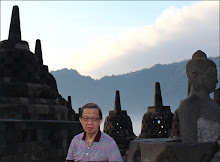Darwin's book costs the price of a flat
A copy of the most influential book published in the 19th Century was sold a few days ago for £103,250 in London. This first-edition copy of Charles Darwin’s On the Origin of Species has been kept in a British family’s guest washroom for 40-50 years without anyone realising its value.
The amount is equivalent to S$235,000, enough to buy a small housing flat.
An anonymous telephone bidder purchased the book on the 150th anniversary of the original publication. It is Darwin’s seminal book that shared his theory of evolution with a lay audience.
I also own a copy, not the first edition, but a 2006 edition published by the Folio Society, for which I paid nearly £43 (£34.95 + £8 shipping):

Read more at NS Blog
The amount is equivalent to S$235,000, enough to buy a small housing flat.
An anonymous telephone bidder purchased the book on the 150th anniversary of the original publication. It is Darwin’s seminal book that shared his theory of evolution with a lay audience.
I also own a copy, not the first edition, but a 2006 edition published by the Folio Society, for which I paid nearly £43 (£34.95 + £8 shipping):

Read more at NS Blog


